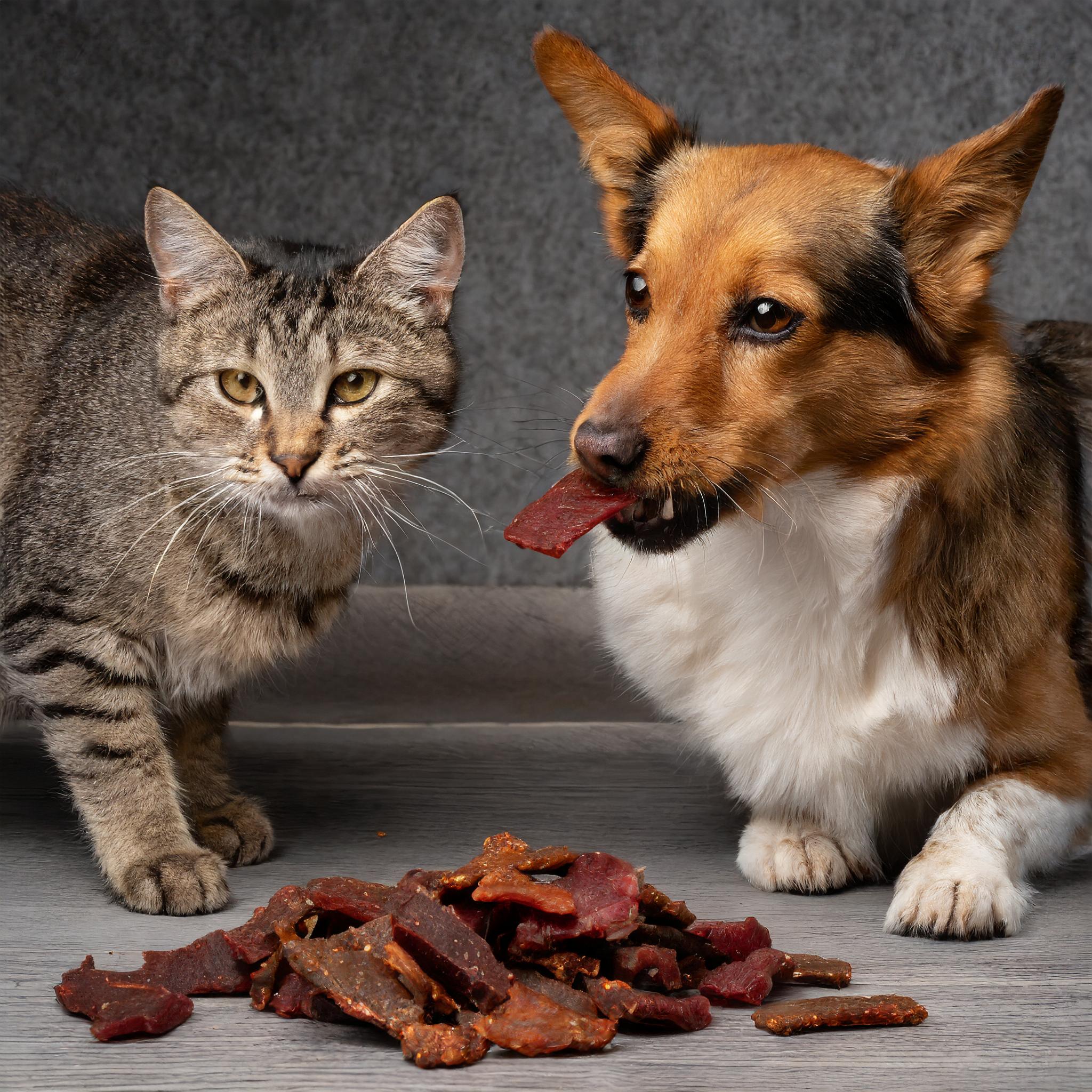Is Beef Jerky Safe for Dogs and Cats?

Beef jerky has long been hailed as a favourite snack among humans, revered for its savoury flavour and convenient, on-the-go packaging. However, as pet owners, we often find ourselves wondering whether this beloved treat is suitable for our furry companions, particularly our dogs and cats. While beef jerky may seem like an enticing option to share with our pets, concerns about its safety and potential risks have sparked debates among pet owners and veterinarians alike.
In recent years, the popularity of beef jerky as a snack for pets has surged, with many pet owners opting to share this delectable treat with their canine and feline companions. However, alongside its rising popularity comes a growing awareness of potential health hazards associated with feeding beef jerky to pets. From questionable ingredients to potential allergens, pet owners are rightfully cautious about the impact of beef jerky on their pets’ well-being.
In this article, we delve into the question: Is beef jerky safe for dogs and cats? We’ll explore the nutritional value of beef jerky, potential risks and concerns associated with feeding it to pets, and provide expert insights from veterinarians to help pet owners make informed decisions about whether beef jerky is a suitable treat for their furry friends. So, before you toss that strip of beef jerky to your pet, let’s take a closer look at the facts to ensure their safety and well-being are prioritised.
Understanding Beef Jerky
Beef jerky, a popular snack enjoyed by humans, is often made from thinly sliced strips of beef that are seasoned and dried to achieve a chewy texture and intense flavor. This preservation method dates back centuries and was initially used as a way to prolong the shelf life of meat without the need for refrigeration. Today, beef jerky is available in various flavors and styles, ranging from classic to exotic, catering to a diverse range of tastes.
What Beef Jerky Is and How It’s Made
Beef jerky is essentially a dried meat product that undergoes a process of dehydration or drying to remove moisture, inhibiting the growth of bacteria and preventing spoilage. The meat is typically marinated or seasoned with a combination of spices, herbs, and flavourings to enhance its taste. Once seasoned, the meat strips are laid out and subjected to low heat or air-drying methods, such as smoking, oven-drying or by using a dehydrator, until they reach the desired texture and flavour profile.
Common Ingredients and Potential Additives or Preservatives
While traditional beef jerky recipes may consist of simple ingredients like salt, pepper, and natural spices, commercially available beef jerky often includes a wider array of additives and preservatives to enhance flavour, texture, and shelf life. Common ingredients found in beef jerky may include soy sauce, Worcestershire sauce, sugar, garlic powder, onion powder, and various flavour enhancers.
However, it’s essential for pet owners to be aware of potential additives or preservatives that could be harmful to their pets. Ingredients such as onion powder, garlic powder, and certain flavour enhancers may not be suitable for dogs and cats and could cause adverse reactions or digestive issues. Therefore, it’s crucial to carefully examine the ingredient list and choose beef jerky products that are free from potentially harmful additives when considering them as treats for pets.
Potential Benefits of Beef Jerky for Pets
Beef jerky, with its concentrated meaty goodness, may offer some potential benefits for our beloved pets, particularly dogs and cats. Let’s explore the nutritional value of beef jerky and its possible advantages for our furry friends.
Nutritional Value Beef Jerky May Offer to Dogs and Cats
Beef jerky is primarily composed of protein, making it a valuable source of this essential nutrient for dogs and cats. Protein is crucial for maintaining muscle mass, supporting tissue repair, and overall growth and development in pets. Additionally, beef jerky may provide essential amino acids, vitamins, and minerals that contribute to a well-rounded diet for pets.
Protein Content and Potential Benefits for Muscle Health
Protein content in beef jerky varies depending on the quality of the meat and the specific recipe used. However, beef jerky is generally recognised as a high-protein snack, which can be beneficial for promoting muscle health and supporting an active lifestyle in dogs and cats. Adequate protein intake is essential for maintaining lean muscle mass, supporting energy metabolism, and ensuring overall vitality in pets.
In summary, beef jerky may offer nutritional value to dogs and cats by providing essential protein and other nutrients that contribute to their overall health and well-being. However, it’s essential to consider beef jerky as a treat rather than a primary source of nutrition and to feed it to pets in moderation to avoid potential health risks associated with excessive consumption. As with any dietary supplement or treat, pet owners should consult with their veterinarian to ensure that beef jerky is suitable for their pet’s individual needs and dietary requirements.
Risks and Concerns
While beef jerky may offer some potential benefits for pets, it’s essential for pet owners to be aware of the risks and concerns associated with feeding this popular snack to dogs and cats. Let’s delve into some of the potential hazards and considerations to keep in mind when offering beef jerky to our furry companions.
Potential Risks Associated with Feeding Beef Jerky to Pets
Feeding beef jerky to pets, particularly dogs and cats, can pose several risks and concerns. One of the primary concerns is the high sodium content found in many commercially available beef jerky products. Excessive sodium intake can lead to dehydration, electrolyte imbalances, and increased blood pressure, which may have adverse effects on pets’ health, especially those with underlying medical conditions such as kidney disease or heart disease.
Additionally, the presence of certain additives, flavourings, and preservatives in beef jerky can be problematic for pets. Ingredients such as onion powder, garlic powder, and artificial flavour enhancers may be toxic to dogs and cats and could potentially cause gastrointestinal upset, allergic reactions, or other adverse effects.
Specific Ingredients That May Be Harmful or Problematic for Dogs and Cats
Specific ingredients commonly found in commercial beef jerky products may be harmful or problematic for dogs and cats. For example, onion powder and garlic powder, which are often used as flavour enhancers, contain compounds that can cause damage to pets’ red blood cells and lead to anaemia, particularly in dogs. Additionally, certain artificial flavourings and preservatives may trigger allergic reactions or digestive issues in pets, compromising their health and well-being.
It’s crucial for pet owners to carefully read ingredient labels and avoid beef jerky products that contain potentially harmful additives or flavourings when considering them as treats for their pets. By being vigilant about ingredient quality and mindful of potential risks, pet owners can help ensure that their furry companions enjoy safe and healthy snacking experiences.
Common Additives to Watch Out For
When it comes to commercial beef jerky products, pet owners should be vigilant about the presence of common additives or flavourings that could potentially impact their pets’ health. Let’s explore some of these additives and flavourings and their potential impact on pet well-being.
Common Additives or Flavourings Found in Commercial Beef Jerky
Commercial beef jerky products often contain a variety of additives or flavourings designed to enhance taste, texture, and shelf life. While some additives may be harmless or even beneficial, others can pose risks to pets’ health if consumed in excess or if pets have sensitivities or allergies to specific ingredients.
Some common additives or flavourings found in commercial beef jerky include:
- Artificial flavour enhancers: These additives are often used to enhance the taste and aroma of beef jerky, but they may contain synthetic chemicals or compounds that could be harmful to pets if ingested in large quantities.
- Preservatives: Preservatives such as sodium nitrite or sodium erythorbate are commonly used to extend the shelf life of beef jerky by inhibiting the growth of bacteria and preventing spoilage. While these preservatives are generally recognized as safe for human consumption, they may have adverse effects on pets if consumed in excessive amounts.
- Sweeteners: Some beef jerky products may contain added sugars or artificial sweeteners to enhance sweetness or balance out other flavours. While small amounts of sweeteners may not pose significant risks to pets, excessive sugar intake can contribute to obesity, dental issues, and other health problems in pets.
Potential Impact on Pet Health
The presence of common additives or flavourings in commercial beef jerky products can have various potential impacts on pet health. For example, artificial flavour enhancers or preservatives may contain chemicals or compounds that could be toxic to pets if ingested in large quantities. Additionally, certain additives may trigger allergic reactions or sensitivities in pets, leading to symptoms such as itching, gastrointestinal upset, or skin inflammation.
It’s essential for pet owners to carefully read ingredient labels and familiarise themselves with common additives or flavourings found in commercial beef jerky products. By being aware of potential risks and selecting products that prioritise pet safety and well-being, pet owners can help ensure that their furry companions enjoy safe and nutritious snacking experiences.

Allergies and Sensitivities
While beef jerky may be a tempting treat for pets, it’s essential for pet owners to be mindful of the potential for allergies or sensitivities to certain ingredients found in beef jerky. Let’s explore the possibility of pets developing allergies or sensitivities to beef jerky ingredients and how to recognise signs of allergic reactions in pets.
Possibility of Pets Developing Allergies or Sensitivities to Beef Jerky Ingredients
Pets, like humans, can develop allergies or sensitivities to certain ingredients found in beef jerky. Common allergens in beef jerky include ingredients such as wheat, soy, corn, and various flavour enhancers or preservatives. While some pets may tolerate these ingredients well, others may experience adverse reactions, ranging from mild to severe.
Pets with existing food allergies or sensitivities may be at higher risk of reacting to beef jerky ingredients, particularly if they have previously shown sensitivity to similar ingredients in their diet. Additionally, pets with underlying health conditions or compromised immune systems may be more susceptible to developing allergies or experiencing adverse reactions to beef jerky.
How to Recognise Signs of Allergic Reactions in Pets
It’s essential for pet owners to be vigilant and proactive in monitoring their pets for signs of allergic reactions when introducing new treats or foods, including beef jerky. Common signs of allergic reactions in pets may include:
- Itching or scratching
- Skin redness or inflammation
- Hives or welts
- Gastrointestinal upset (vomiting, diarrhoea)
- Sneezing or coughing
- Difficulty breathing
- Swelling of the face, lips, or tongue
If a pet exhibits any of these symptoms after consuming beef jerky or any other treat, it’s crucial to discontinue feeding the treat immediately and consult with a veterinarian for further evaluation and guidance. Allergic reactions can range from mild to severe and may require medical intervention to manage symptoms and prevent complications.
By being proactive in identifying and addressing potential allergies or sensitivities to beef jerky ingredients, pet owners can help ensure their furry companions enjoy safe and enjoyable snacking experiences. Additionally, working closely with a veterinarian can provide valuable guidance and support in managing and addressing pet allergies effectively.

Safe Beef Jerky Alternatives
While beef jerky may not be suitable for all pets due to potential risks and concerns, there are plenty of safe and nutritious alternatives that can provide similar benefits without the associated hazards. Let’s explore some alternative protein-rich snacks or treats that are safe and appropriate for dogs and cats, as well as homemade options or commercially available pet treats specifically designed to meet pets’ dietary needs.
Alternative Protein-Rich Snacks or Treats
There are several alternative protein-rich snacks or treats that pet owners can offer their dogs and cats as healthy alternatives to beef jerky. Some examples include:
- Freeze-dried meat treats: Freeze-dried meat treats made from single-ingredient proteins such as chicken, turkey, or fish can provide pets with a nutritious and satisfying snack option. These treats are typically free from additives, preservatives, and artificial flavourings, making them a safer choice for pets with sensitivities or allergies.
- Dehydrated meat treats: Dehydrated meat treats made from high-quality cuts of meat can offer pets a chewy and flavorful snack option. These treats are often minimally processed and contain no artificial additives or preservatives, making them a healthier alternative to commercially available beef jerky.
- Raw meaty bones: Raw meaty bones, such as chicken necks or beef ribs, can provide pets with a natural and nutritious snack option. These bones are rich in protein, calcium, and other essential nutrients, and can help support dental health by promoting chewing and gnawing behaviour.
Homemade Options or Commercially Available Pet Treats
In addition to alternative protein-rich snacks or treats, pet owners may also consider homemade options or commercially available pet treats specifically designed to meet pets’ dietary needs. Some examples include:
- Homemade jerky treats: Pet owners can make their own homemade jerky treats using lean cuts of meat and a food dehydrator or oven. Homemade jerky treats allow pet owners to control the ingredients and avoid potentially harmful additives or preservatives found in commercial beef jerky products.
- Commercially available pet treats: There are many commercially available pet treats on the market that are specifically formulated to meet pets’ dietary needs. These treats often come in a variety of flavours and textures and may be fortified with vitamins, minerals, and other beneficial ingredients to support pets’ health and well-being.
By exploring alternative protein-rich snacks or treats and considering homemade options or commercially available pet treats specifically designed for pets’ dietary needs, pet owners can provide their furry companions with safe, nutritious, and enjoyable snacking experiences while minimising potential risks and concerns associated with beef jerky. Additionally, consulting with a veterinarian can provide valuable guidance and recommendations for selecting suitable treats that meet pets’ individual needs and preferences.


